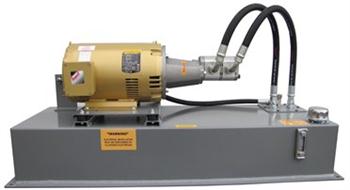Bits and Pieces
There are four major components to a press, which are: the pump, the reservoir, the actuator(s) (cylinder, motor, etc.) and the valves.
The pump can be a piston, a vane or a gear, depending on which application you want to use it for. Basically, they are to move a volume of fluid against a pressure or a resistant load held in a reservoir. The hydraulic reservoir’s purpose is also to ease moisture and air release from the fluid and allow solid contaminants to decant. As for hydraulic actuators, they are the ones that convert hydraulic energy in mechanical energy, while the valves direct the flow of the fluid, start it or stop it.
Pumps and Valves
The three types of pump: piston, vane or gear, have to be treated differently lubricant-wise.
Piston Pumps: Generally speaking, piston pumps are the most versatile pump type, offering many options for all kinds of systems. They are available in variable displacement and fixed designs. Best wear-resistant pump type among the three, they are quiet and very efficient. Normal fluid viscosity ranges from 10 to 160 cSt, and these can work under pressures beyond 6000 psi.
Vane Pumps: Many variations, similar design principles. Roughly, a slotted rotor attached to a drive shaft that turns inside a cam ring. The cam ring has to be eccentric to the drive shaft or offset. While the rotor turns, rotor slots, in which the vanes are inserted, follow the cam ring’s inner surface. Since these two surfaces are always in contact, wearing of the surface cause the vanes to come further out of their slot. May not be the best choice in critical high-pressure hydraulic systems where fluid quality and contamination are harder to control. High-performance fluid antiwear additive is essential.
Gear Pumps: Either external or internal, both with subtypes that build flow the same way: fluid is carried through a meshing gear set’s teeth. Although more fluid-contamination tolerant, they are generally not as efficient as vane or piston pumps. Both internal and external can handle pressure ranges from 3000 to 3500 psi, and up to 2200 cSt viscosity range. Internal gear pumps are usually quiet and have a high efficiency despite a low fluid viscosity. Widespread, external gear pumps viscosity ranges are narrowed to less than 300 cSt. They offer an inexpensive fixed displacement delivery to a system, of mid-volume and mid-pressure.
Go with the flow
Energy transmitter, lubricant, heat transfer vehicle and contamination controller, hydraulic fluid is what makes the
hydraulic shop presses work! Three main kinds of lubricants are available, synthetics, water-based or petroleum based and they all have a different viscosity, seal compatibility and additive package. On top of it, they are all different when it comes to viscosity index, wear resistance and oxydation stability. These factors will affect the way your fluid performs within your system.
The most widely used are mineral-based or petroleum-based. Specific performance characteristics such as antiwear or rust and oxydation inhibitor (R&O) can be added to a mineral-based fluid through an additive. Mineral-based fluids of high quality are readily available at a low cost.
For high pressure needs, synthetic fluids have excellent lubrication properties. Some are fire resistant, offer a thermal stability, are natural detergents and offer a lower friction. However, they are more expensive, often times they won’t be compatible with standard seal materials and require special disposal since they are slightly toxic.
Mostly used when fire resistance is required, water-based fluids, offered as water glycol blends, oil-in-water emulsions or water-in-oil (invert) emulsions need to be monitored closely. Their high-water content evaporates when the temperature rises, thus making viscosity go higher. They have many disadvantages and are more-expensive than petroleum-based fluids.
To make sure your investment works well for a long time; do not hesitate to contact your
top quality hydraulic press manufacturer for more advice on how to find the perfect hydraulic fluid to operate your press!

